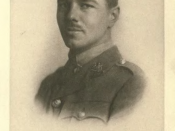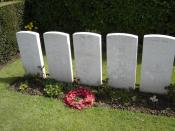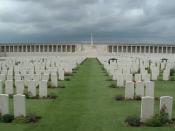"Mankind must put an end to war, or war will put an end to mankind." - John Fitzgerald Kennedy. William Stafford and Wilfred Owen are two poets who would undoubtedly concur with this statement. Both poets are objectors to war. However, the way each one conveys his message is different. The tone, descriptions, and literary devices used in each work are rather opposite. The main reason for this is the author's life experiences. Stafford did not participate in war combat, though he firmly opposed it. Owen, however, was an active member of the military, having served in World War I. The surrounding environment affects a person and his take on life. This proves that each author's personal experiences influence the tone, effect of imagery, style, and other literary devices. Though the message is the same, it is presented in completely opposite ways.
"At the Un-National Monument Along the Canadian Border," was written by William Stafford to show his appreciation of peace by being rather sarcastic towards war.
In the beginning, he states, "This is the field where the battle did not happen, where the unknown soldier did not die. This is the field where grass joined hands, where no monument stands. The only heroic thing is the sky." (1-4) With a rather simple and calming tone, as if he was talking, Stafford shows that in his eyes, the field most beautiful, and most honorable is the one that war has never touched. To write about nature and use that convey his opposition to war is a brilliant use of imagery. Nature is considered peaceful and tranquil; war is considered violent and tragic. In "Dulce et Decorum Est," Owen speaks as a soldier, who has been wounded twice, and despises war. "Bent double, like old beggars under sacks,


